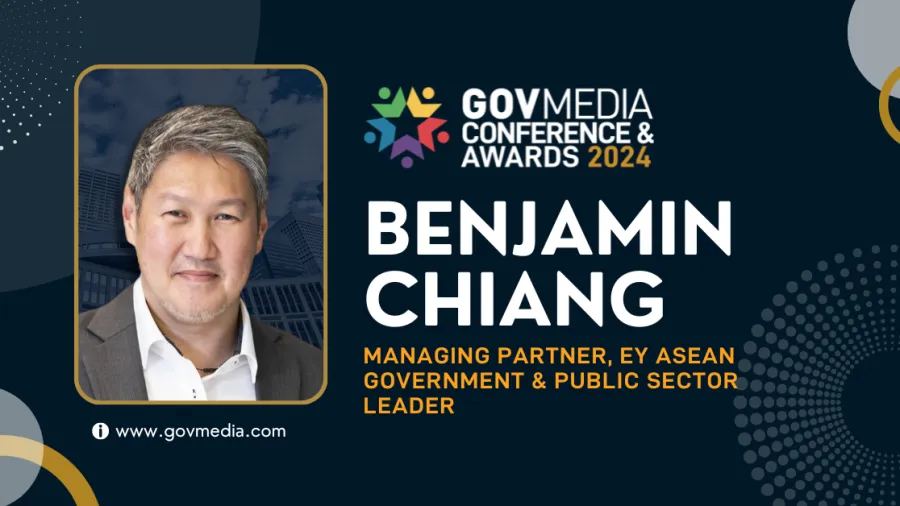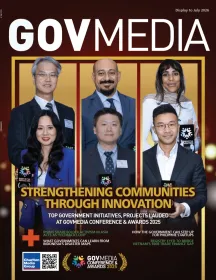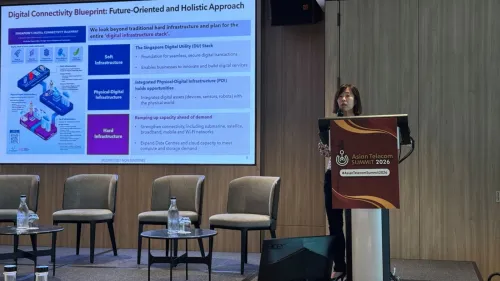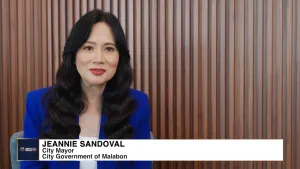
Benjamin Chiang of EY: Strong cybersecurity is key to fostering innovation without hindering progress
Explore the dynamic dialogue with Benjamin Chiang, EY Asean Government & Public Sector Leader, as he discusses enhanced governance in the digital age.
Amidst rapid technological advancements and evolving societal needs, governance is crucial to ensuring effective public service delivery whilst navigating the complexities of modern challenges.
Benjamin Chiang, EY Asean Government & Public Sector Leader, and Technology Assurance Leader at Ernst & Young LLP, offers invaluable insights into shaping the future of governance. Chiang brings a wealth of experience to the table. With a focus on leveraging technology to address the intricate demands of public service innovation, he has played a pivotal role in spearheading smart city transformation projects across Southeast Asia. As a seasoned technology assurance professional, his expertise extends to data governance, cybersecurity, and fostering innovation within governmental frameworks.
In this interview, Chiang, as a judge for the GovMedia Conference & Awards 2024, shares profound insights into the dynamic realm of governance. He sheds light on the challenges, opportunities, and emerging trends shaping the future landscape. From navigating the complexities of data governance and analytics in smart city initiatives to striking the delicate balance between innovation and cybersecurity, Chiang offers pragmatic strategies to foster sustainable development whilst ensuring robust governance frameworks.
Given your extensive experience in cybersecurity, what are the key challenges governments face in ensuring robust data governance and analytics, especially in the context of smart city initiatives? How do you recommend addressing these challenges?
A common challenge faced in the process of executing smart city initiatives is the data silos across different agencies that are stored in separate systems, making it difficult to compile and analyse centrally for comprehensive insights. The evolving data privacy and security regulatory landscape and a lack of understanding of these regulations, further discourage sharing of data for fear of violating citizens’ data privacy.
To manage these concerns, a possible solution would be to centrally plan and coordinate smart city initiatives and have security considered as part of the design rather than an afterthought. Investment in a common infrastructure and data-sharing platform across multiple agencies via an application programming interface (API) gateway can help support this effort. Having the best processes and systems will not guarantee success because the weakest link is often the human element. As such, having adequate training and skills upgrading to equip public officers to be well-versed in data privacy and security requirements is another key area that needs to be addressed.
How do you recommend striking the right balance between fostering innovation in public services and maintaining robust cybersecurity measures?
Striking a balance between cybersecurity and innovation is about finding the cohesion point that allows government agencies to keep their systems and data safe whilst not discouraging progress and creativity.
Cybersecurity can be a driver of innovation – the right cybersecurity measures can give the government agency the confidence to innovate at pace. Think of the brakes in a race car; whilst the primary purpose of the brakes is to slow down the car, its ability to slow the car down when needed gives the driver the confidence to go around a race track in the fastest time.
As a forward-thinking advisor, what emerging trends do you foresee in the realm of government and public sector technology, particularly in the context of smart cities?
Artificial intelligence (AI) and machine learning (ML) will have an outsized impact on smart cities, and the requisite infrastructure must be in place for them to take off. These include the internet of things (IoT) and sensors to be embedded all around us, bridging the digital and physical worlds; 5G and 6G networks that provide high speed, low latency interconnectivity; and further development in AI and ML, especially generative AI and large language models (LLM).
AI and ML are the foundations of data analysis to predict trends whilst automating and enhancing city services. Examples include traffic management systems, power usage prediction, waste management, and public safety initiatives.
In the context of smart city transformations, public engagement is crucial. How do you advise governments to effectively communicate and involve citizens in the decision-making processes related to technological innovations and city development?
Identifying the right stakeholders and personas is crucial to the success of any transformational project. EY Connected Citizen research illustrates how developing a set of personas, which are fictional representations of the product or service's ideal users, can help to ensure that diverse groups of stakeholders are correctly identified and their needs addressed.
Many citizens are open to more data- and technology-enabled public services and more engagement in how the services are designed and delivered. This creates an opportunity to strengthen the relationship between governments and the people they serve and renew the trust that is vital to an effective government. Innovative policy design, inclusive digitalisation, better use of data and participatory engagement with citizens will be important for governments to respond effectively.
In the process of transformation, it is important to listen to what stakeholders have to say, understand the source of their concerns and seek to address issues in an emotionally supportive and constructive way. Emotions are the key to unlocking a successful transformation. If the government agency understands the emotional state of the citizens throughout the transformation journey, it will be able to identify the early warning signals when things are going wrong and make adjustments accordingly to get the transformation back on track.
As technology continues to advance, ethical considerations become more prominent. How do you navigate and advise governments on ethical considerations when implementing innovative solutions?
Market forces may not achieve the optimal outcome, so governments have an important part to play in regulating the use of innovative solutions. To manage this, the government can develop and define ethical guidelines. As well, it is important to foster trust by being transparent about what the government agency is doing, why they are doing it, what data they are using, how it is being used, as well as how the agency is protecting the collected data.
Leaders must hold individuals and teams accountable for ethical decision-making, including creating clear lines of responsibility and oversight. To maintain governance and transparency, all public officers should undergo ethics training, so everyone in the organisation understands the importance of ethical considerations and how to address them.
As a judge at the GovMedia Conference & Awards 2024, what criteria will you be looking for in the submissions?
Government projects and initiatives in Asia are instrumental in shaping the region's development and progress and contributing to the well-being of the citizens and the global economy. The region is also unique in its diversity and rich culture; realising its full potential will be a fulfilling mission for organisations looking to transform the cities.
As such, the submissions for the awards must present novel, creative, and innovative solutions. The projects should improve the citizen experience via citizen-centric solutions, or enhance productivity and increase efficiency for government agencies. Ultimately, there must be transformative outcomes and high adoption rates from these efforts.












